How And When To Use Vitamin E Oil For Tattoos
Discover the ultimate secret compound to maintaining a healthy and vibrant ink.

Image: Shutterstock
Tattoo aftercare requires numerous considerations, from using mild cleansers and fragrance-free products to avoiding sunlight and itching around the scabbing as much as possible. With so many products for proper healing, you may be wondering, is vitamin E oil good for tattoos? Well, the use of vitamin E oil for tattoo aftercare is a topic of constant debate within the tattoo community. Some people believe that using it may help decrease the tattoo healing time and maintain the vibrancy of old tattoo colors. Others think that using the oil may fade the fresh tattoo ink. However, none of these statements have any scientific backing, making them mere assumptions. In this article, we will uncover the factual truth behind these statements, and help you figure out how and when to use vitamin E oil on tattoos for maximum benefits. Read on to find out!
In This Article
Is Vitamin E Oil Good For Tattoos?
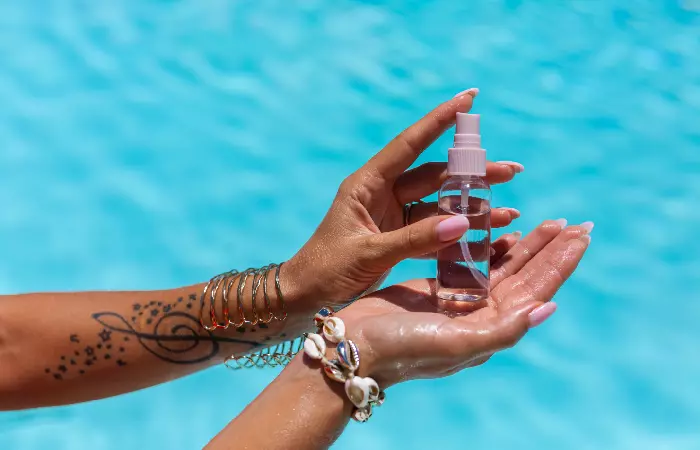
Vitamin E oil is a quite commonly suggested remedy for tattoo healing and maintaining its vibrancy. The idea behind this is that new tattoos are open wounds or severe abrasions on your skin and require adequate protection for proper healing. Since vitamin E is a potent antioxidant, it may protect the skin against damage by fighting oxidative stressi A condition where the balance between free radicals (oxygen molecules) and antioxidants is affected, which may lead to organ damage and diseases and aid wound healing (1).
However, the effectiveness of vitamin E oil for tattoos is debated among experts, as research suggests that in rare cases, its topical application may lead to chronic skin conditions like contact dermatitisi A skin condition characterized by inflammation and redness resulting from direct contact with irritants like fragrances and dust and/or erythema multiformei A hypersensitivity reaction characterized by red raised skin all over the body triggered by infections or medications (2). It is also important to note that scientific evidence supporting the oil’s use specifically for tattoos is limited. Therefore, if you are considering the use of vitamin E oil or tattoo care products including vitamin E as a key ingredient, it is best to consult with your doctor and be attentive to your skin’s response.
 Did You Know?
Did You Know?Anecdotal evidence suggests that this natural, plant-based tattoo oil may be beneficial for your tattoos. Let us learn about these advantages of vitamin E oil in the next section.
Key Takeaways
- Vitamin E oil is a commonly suggested natural remedy for tattoo aftercare due to its antioxidant properties and ability to protect the skin against free radical damage. However, scientific evidence supporting its use specifically for tattoos is limited.
- When used on a tattoo after its initial healing process, it may soothe skin dryness and itchy tattoos, prevent signs of aging like loose skin, and bring out the colors of the ink.
- You may reapply the oil 2-3 times a day. However, avoid using too much of it, as it is comedogenic in nature and may lead to common side effects like irritation and breakouts.
Vitamin E Oil Benefits For Tattoos

Here are some potential benefits of using vitamin E oil for tattoos:
- May Soothe Irritation And Dryness
Vitamin E oil is known for its hydrating properties and can help keep the skin healthy and enhance elasticity of both the dermis and epidermis (4). This way, it may help prevent dehydration and dryness when applied to the tattooed area. Further, do note that dry skin is linked with itchiness (5). Hence, the oil may also help keep itching and irritation at bay.
- May Speed Up The Healing Process
Research suggests that applying vitamin E to the skin before and after surgery may promote surgical wound healing without the risk of infection (6). This is because the oil has antioxidant benefits and helps fight free radicals (1). Since tattoos are considered open wounds, the oil may be beneficial for them. However, another study suggests that vitamin E may not aid in reducing the healing time and is linked with adverse effects and risk of chronic skin conditions, like contact dermatitis (7).
Helen, a makeup and lifestyle blogger with debilitating eczema issues, talks about how vitamin E oil is the extra healing push her skin needs after a severe breakout. She writes, “I have to read every label, and weigh in the pros and cons for every ingredient. It makes simple things like hand washing the dishes a hard task (I normally get chemical burns even from the mildest soaps). Sometimes I need something just a bit extra to help my skin heal, if problems arise. Vitamin E has always been something I have used, as oil, supplement or ointment, ever since getting my first tattoo (i).”
- May Protect The Tattoo From UV Damage
According to research, vitamin E has strong photoprotective properties, especially when combined with topical vitamin C. Due to this, it may protect the skin against damaging UV radiation. This, in turn, may help reduce skin redness and swelling (4). Due to this, it is believed that you can also use vitamin E oil to keep your tattooed skin safe from harmful sun exposure. However, further studies are needed to confirm this claim. Therefore, it is recommended that even if you use vitamin E oil, you should also apply a broad-spectrum sunscreen on top for an extra layer of protection.
- May Prevent Tattoo Aging
As mentioned earlier, vitamin E has antioxidant benefits and can help fight damaging free radicals that cause Oxidative Stress (1). Research suggests that these free radicals are reactive oxygen species that may alter collagen production and cause cell damage, which may lead to skin aging (2). Due to this, applying vitamin E oil on your tattooed skin may prevent signs of aging like reduced skin elasticity and wrinkles. This, in turn, may keep your tattoo from looking stretched and wrinkled and prevent its fading over time.
- May Bring Out The Tattoo Color
Anecdotal evidence suggests that applying vitamin E oil to older tattoos may make their colors appear vibrant and significantly deeper. However, it is important to note that the oil does not actually enhance the vibrancy and depth of colors in your tattoos. They appear that way only due to the shine that the oil adds to the skin.
- May Have Long-Lasting Effects
Anecdotal evidence suggests that vitamin E oil may help retain moisture in the skin for up to 16 hours. Therefore, there is no constant need for reapplication as only a few drops of it can provide your skin with long-lasting moisturization. However, it is important to note that since vitamin E oil has a thick texture, it may clog pores and lead to breakouts, especially in acne-prone skin. Therefore, when you apply vitamin E oil to tattoos, keep in mind that little goes a long way.
These benefits of vitamin E for tattoos are amazing, right? But what good are these benefits if you do not know when to use the oil? Scroll down to find out the optimal application process for the best results.
When To Apply Vitamin E Oil To Tattoos
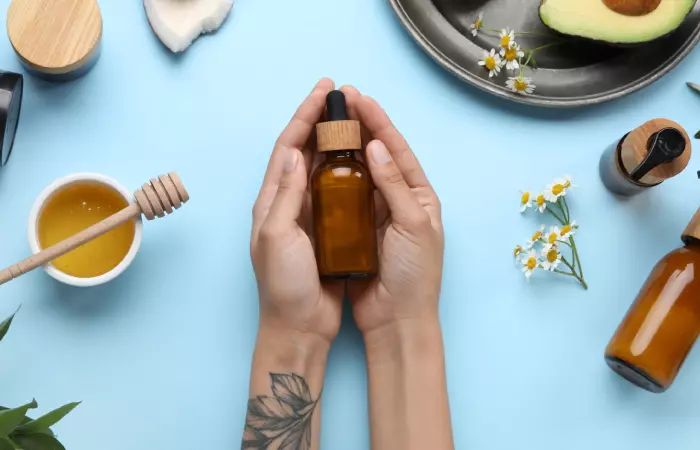
Ideally, you should avoid applying vitamin E oil on a fresh tattoo with broken skin. Instead, allow the initial tattoo healing process to pass before applying any ointments or oils. This means that once you remove the bandage provided by the tattoo artist, wait for at least 1 to 2 weeks. During this time, follow your tattoo artist’s prescribed aftercare routine, like using an antibacterial soap and gentle, fragrance-free moisturizer on the new tattoo. Then, as the third-week approaches, your tattoo may begin to peel. This is when you can apply vitamin E oil on your flaking skin, 1 to 2 times daily, after cleansing your tattooed skin as recommended by your tattoo artist.
Before applying vitamin E oil to your entire tattoo, it is important to perform a patch test, as it may not suit all skin types. Apply a small amount of the oil in the crease of your elbow and wait for 24 hours. If the patch test area does not develop any adverse reactions, such as redness, itching, or irritation, go ahead and use the oil on your tattoo. Check out the next section to learn the steps to follow to apply the oil.
How To Use Vitamin E Oil For Tattoos
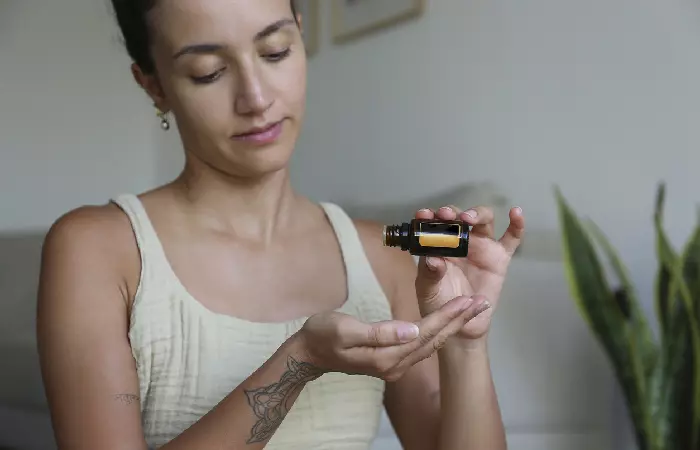
If you decide to use vitamin E oil for your tattoo, here are some general tips on how to apply it:
- Clean Your Tattooed Skin: Gently clean your tattooed skin with a mild, fragrance-free soap and warm water. Use a clean, soft towel to pat the skin dry. Avoid rubbing to prevent irritation.
- Apply The Oil: Once your tattooed skin is clean and dry, take 2-3 drops of diluted vitamin E oil and use your fingertips or a clean cotton swab to apply it to the body art. If you have pure vitamin E oil, you may dilute it with carriers like coconut oil in a 1:4 ratio. You may also use products like topical vitamin E serums and creams instead of oil, on the recommendation of your tattoo artist. However, these vitamin E products may also contain other ingredients like lavender essential oil, hydroxy acids, and tea tree oil that may be harsh on the healing tattoo and lead to skin irritation. Always check the ingredient list of these products to avoid such adverse effects.
- Repeat As Needed: You may reapply the oil 2-3 times a day, or as needed. However, avoid overdoing it, as using excessive amounts may trap moisture, clog pores, and lead to skin irritation and breakouts.
 Quick Tip
Quick TipIt is also important to note that using vitamin E for tattoos is not a substitute for proper aftercare. Therefore, you should continue with the aftercare instructions provided by your tattoo artist, like using a fragrance-free cream and avoiding direct sunlight and excessive stretching of the tattooed area.
While vitamin E oil has many potential benefits for tattoos, anecdotal evidence also suggests that it may fade tattoos. Check out the next section to see if there is any truth behind this claim.
Does Vitamin E Oil Fade Tattoos?
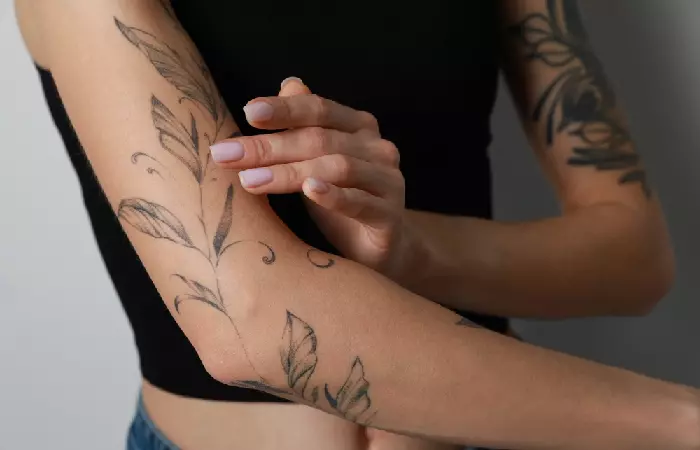
Some people believe that applying vitamin E oil may help reduce the appearance of scars. But it can also indirectly contribute to tattoo fading. However, current evidence does not fully support this claim. In fact, it suggests that topical vitamin E use may sometimes cause side effects like contact urticariai A skin reaction characterized by raised, itchy welts that appear within 10 to 60 minutes of direct contact with an allergen and worsened appearance of scars (7). Further, the tattoo process involves injecting the ink into the dermis, which is the middle layer of skin that is 1.5 to 2 mm below the skin surface (8). This means that even if vitamin E fades surface scars, it cannot affect the ink present in the deeper layers.
The answer to the question, “Is vitamin E oil good for tattoos” depends on your tattoo artist. If they recommend its use, you may give it a shot. Also, there are certain things you need to be mindful of before applying the oil to your newly tattooed skin. For instance, it is not recommended to apply it to a fresh tattoo. Instead, you should wait for at least 1-2 weeks for the initial tattoo healing stages to pass. Once it begins to peel, topical vitamin E oil use is generally considered safe. However, always perform a patch test before applying the oil directly to the tattoo, as it may not be suitable for sensitive skin and lead to common side effects like contact dermatitis and allergic reactions. Along with this, it is important to remember that using vitamin E on tattoos is not a substitute for popper aftercare practices, like gentle cleansing and using SPF to prevent sun damage. Ensure to follow them to maintain the vibrancy of your ink and proper healing.
Frequently Asked Questions
Are aloe and vitamin E good for tattoos?
Yes, aloe and vitamin E are good for tattoos that have passed their initial healing phase. Research suggests that aloe vera has anti-inflammatory and healing properties that may help reduce swelling and skin damage that occurs during the tattooing process (9). Additionally, vitamin E may also help with the healing process (6). Always consult your tattoo artist or dermatologist before using these ingredients and perform a patch test to avoid potential side effects, especially if you have sensitive skin.
Can I use coconut oil and vitamin E for tattoos?
Yes, you may use coconut oil for tattoos that are past their initial healing stage. It not only moisturizes the area but also has antimicrobial and anti-inflammatory properties, which may help prevent tattoo infections and reduce swelling (10).
Vitamin E has hydrating, photoprotective, and anti-aging benefits, which may help keep your tattoo looking vibrant and fresh (4). That said, it is recommended to consult a tattoo artist or dermatologist before using these ingredients.
Can I use vitamin E oil on my tattoo if I have sensitive skin?
Vitamin E can be harsh on sensitive skin. SO, if you want to use it for tattoo healing, mix it with a cream or lotion in a small quantity. Perform a patch test first to check your skin’s tolerance level. And if irritation occurs, stop using it and consult your tattoo artist or a dermatologist for alternative aftercare options.
Illustration: How And When To Use Vitamin E Oil For Tattoos?
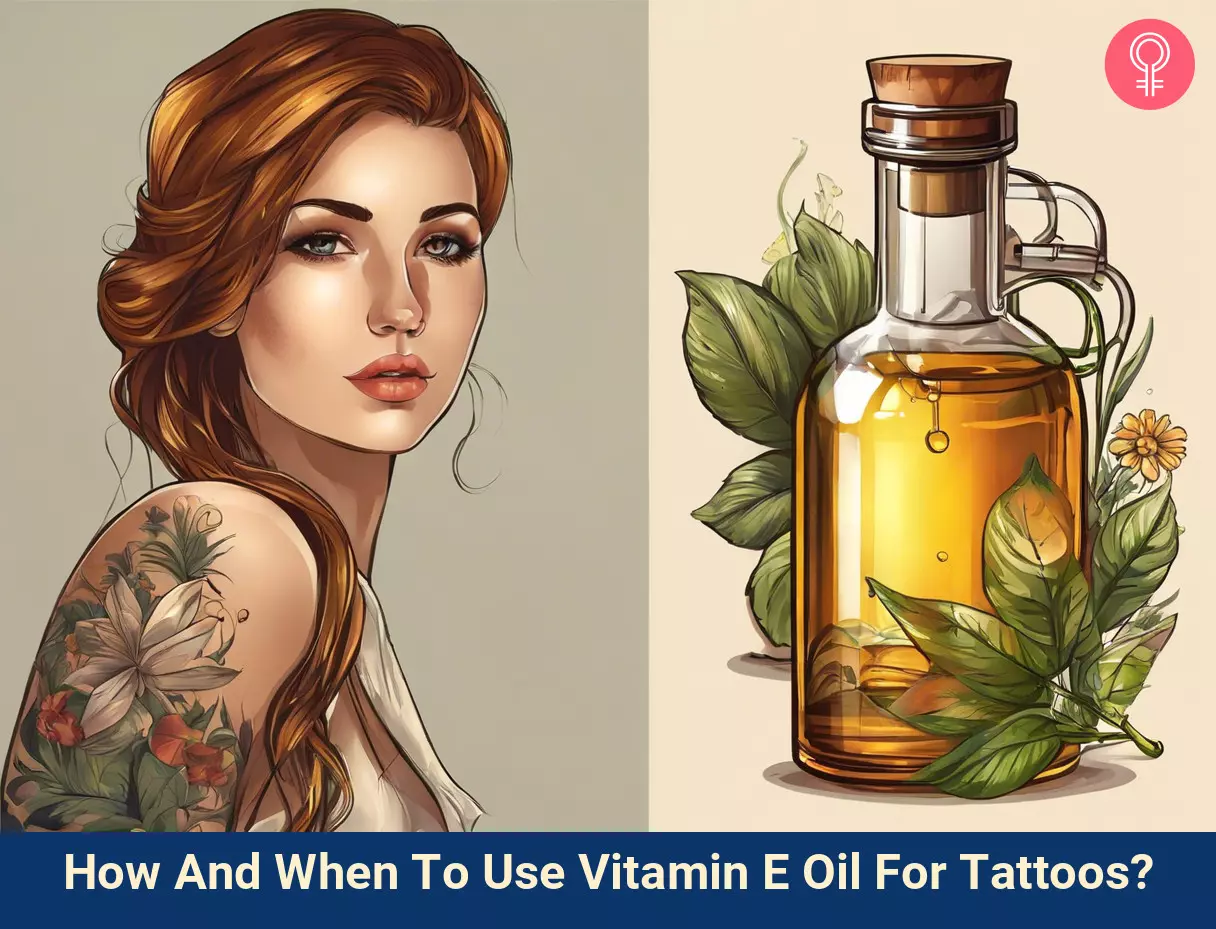
Image: Stable Diffusion/StyleCraze Design Team
Vitamin E oil for tattoo aftercare is hotly debated among experts. While some believe it keeps the tattoo vibrant, others caution it may irritate the skin. Watch this video to see if vitamin E oil is for you.
Personal Experience: Source
StyleCraze's articles are interwoven with authentic personal narratives that provide depth and resonance to our content. Below are the sources of the personal accounts referenced in this article.
(i). Tuesday’s Honest Reviews – Derma-E – Vitamin E Skin Oilhttps://brokedownvanity.wordpress.com/2018/09/25/tuesdays-honest-reviews-derma-e-vitamin-e-skin-oil/
References
Articles on StyleCraze are backed by verified information from peer-reviewed and academic research papers, reputed organizations, research institutions, and medical associations to ensure accuracy and relevance. Read our editorial policy to learn more.
- Vitamin E and wound healing: An evidence‐based review
https://www.ncbi.nlm.nih.gov/pmc/articles/PMC7949595/ - Vitamin E in dermatology
https://www.ncbi.nlm.nih.gov/pmc/articles/PMC4976416/ - History of vitamin E in infant nutrition
https://pubmed.ncbi.nlm.nih.gov/3300257/ - Bioactive compounds for skin health: A review
https://www.ncbi.nlm.nih.gov/pmc/articles/PMC7827176/ - Mechanisms and management of itch in dry skin
https://www.ncbi.nlm.nih.gov/pmc/articles/PMC9129002/ - Wound healing properties of selected natural products
https://www.ncbi.nlm.nih.gov/pmc/articles/PMC6266783/ - Vitamin E for treating children’s scars
https://www.ncbi.nlm.nih.gov/pmc/articles/PMC1781083/ - Tattoo ink nanoparticles in skin tissue and fibroblasts
https://www.ncbi.nlm.nih.gov/pmc/articles/PMC4464189/ - Aloe vera: A short review
https://www.ncbi.nlm.nih.gov/pmc/articles/PMC2763764/ - In vitro anti-inflammatory and skin protective properties of virgin coconut oil
https://www.ncbi.nlm.nih.gov/pmc/articles/PMC6335493/
Read full bio of Ashutosh Bairagi
Read full bio of Joyce Joyson
Read full bio of Madhumati Chowdhury
Read full bio of Aparna Harry





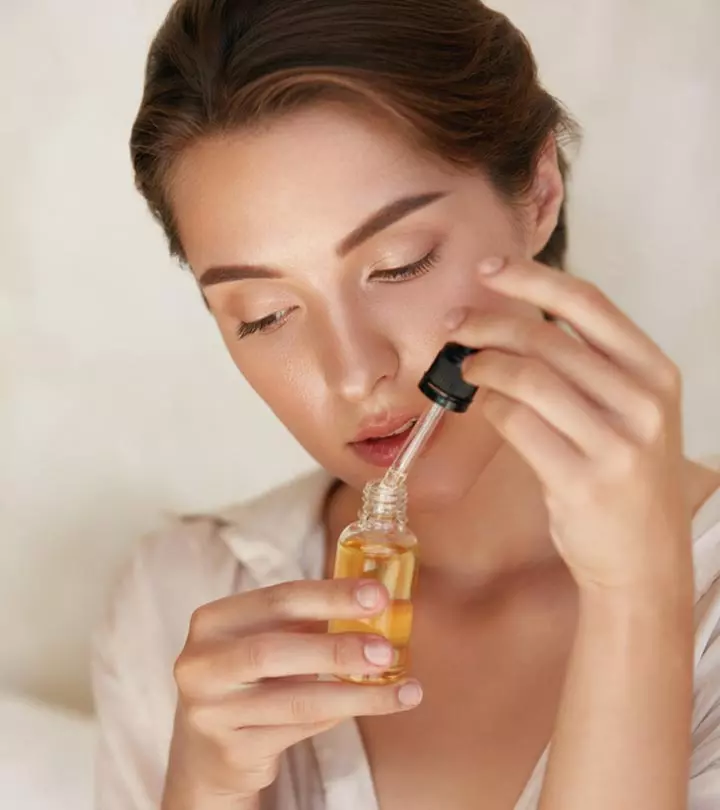



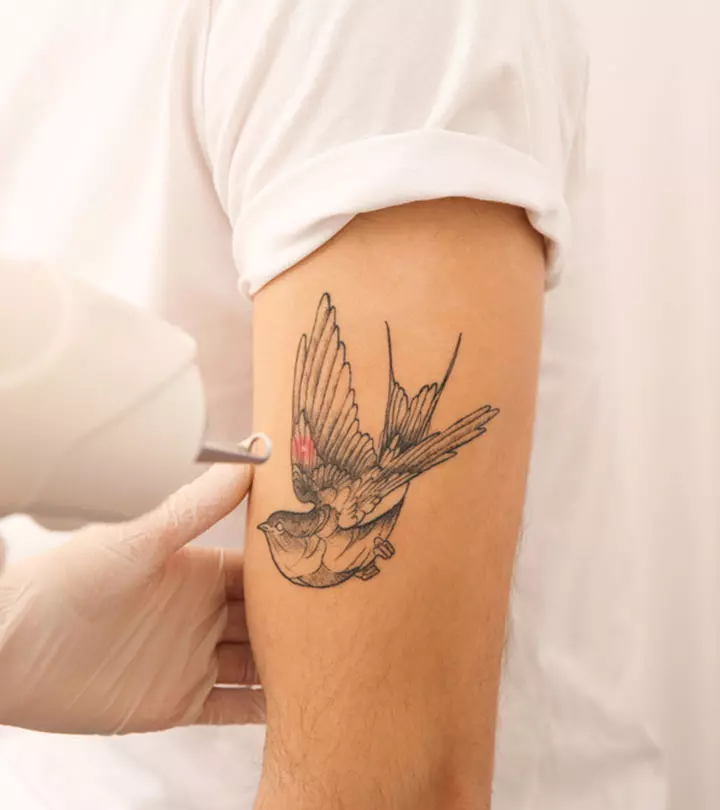

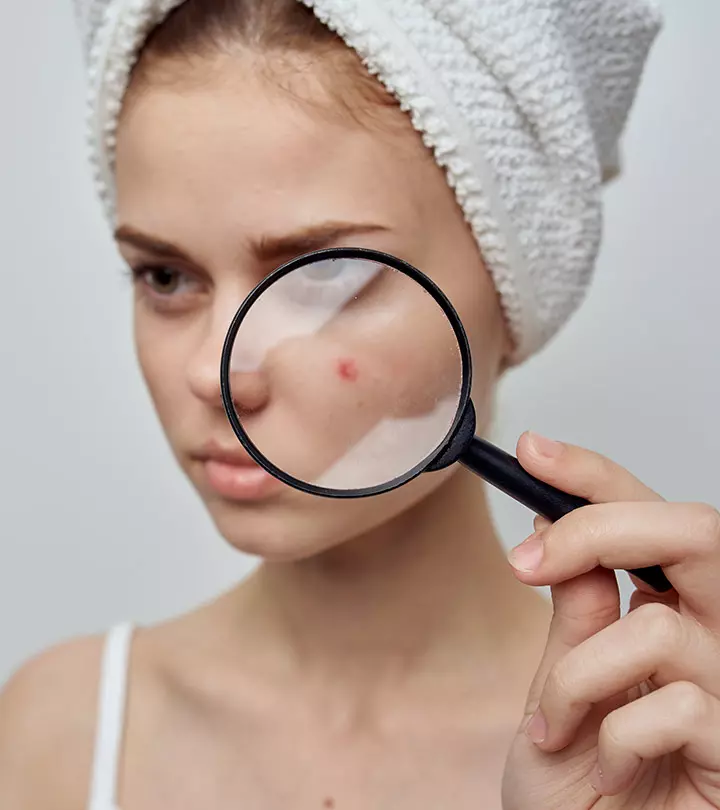






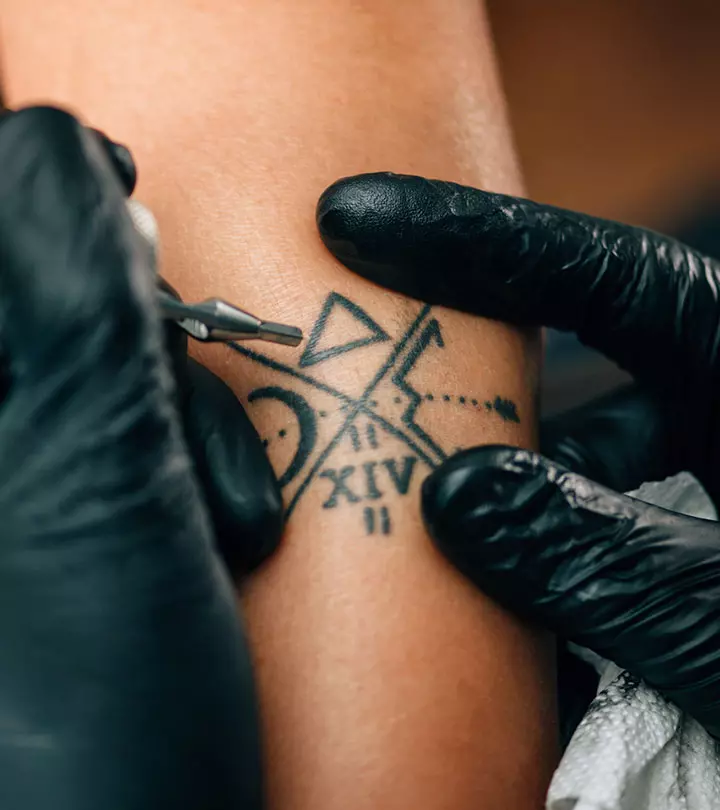



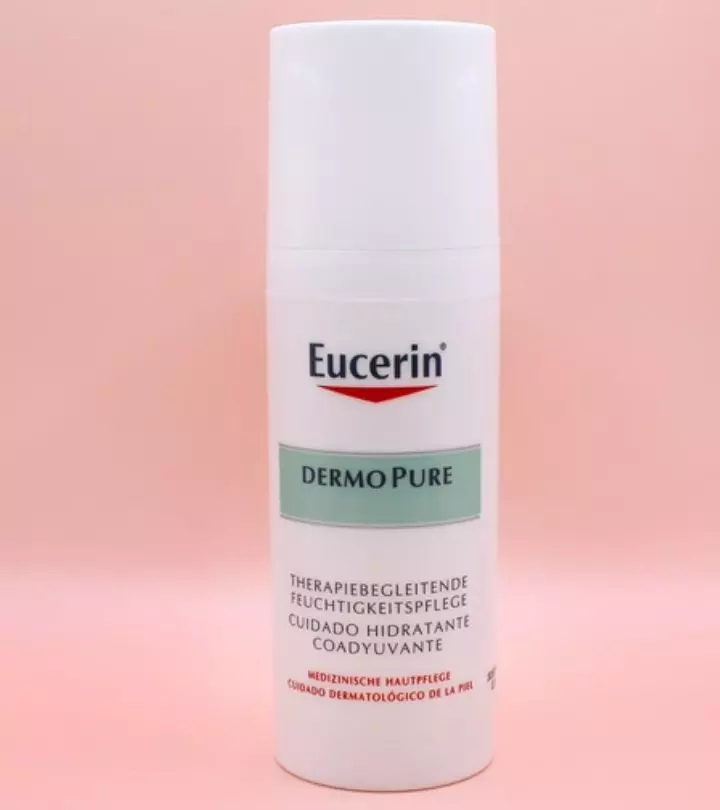

Community Experiences
Join the conversation and become a part of our empowering community! Share your stories, experiences, and insights to connect with other beauty, lifestyle, and health enthusiasts.